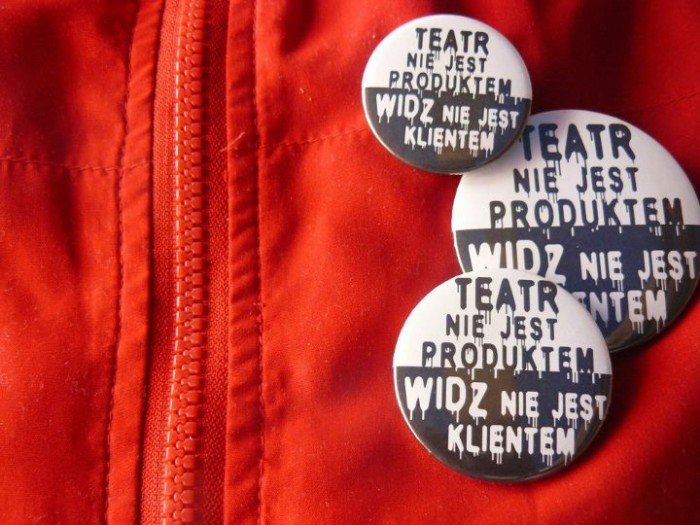“Sprawą, o którą walczymy, jest polski teatr artystyczny – zjawisko unikatowe.”
(What we are fighting to uphold is the unique phenomenon that is artistic theatre in Poland.)
- the “Teatr nie jest produktem...” (Theatre Is Not a Commodity) protest letter (www.popieram.info).
*
In March, just before the spring 2012 Warszawskie Spotkania Teatralne (The Warsaw Theatre Meetings, hereafter referred to as the WST), a group of Polish theatre artists, critics and scholars organises a public letter of protest. They’re enraged by recent actions of the local government of Lower Silesia, the region including Wrocław, Legnica and Wałbrzych – specifically, a short-lived effort to institute a business manager who would be able to overrule decisions made by artistic directors of theatres. Some recent cuts to state funding for theatre are also a concern. The protest slogan: “Teatr nie jest firmą/nie jest produktem, widz nie jest klientem.” (The theatre is not a corporation or a commodity – spectators are not customers). “TEATR NIE JEST PRODUKTEM” buttons appear on the backpacks of the festival-goers.
(A)POLLONIA: AN ANTHOLOGY OF POLISH DRAMA
Forthcoming (2013) from Seagull Books. Co-authored by Joanna Klass, of the Adam Mickiewicz Institute, and Carol Martin.
Editors: Professors Joanna Krakowska and Krystyna Duniec. Most of the plays were first translated from Polish to English by Artur Zapałowski.
According to Klass, the anthology has been organised to reflect the most interesting topics in contemporary Polish theatre, to remove taboos from Polish historical experience, and to present aesthetically challenging texts.
The American universities whose playwriting students and faculty are cooperating on the process of adaptation and translation include USC, Brown, CUNY, Loyola Marymount University, Tisch School of the Arts/NYU and Yale.
This festival and these protests coincide with the visit of a group of playwrights from the United States. They’re in Warsaw because Joanna Klass, director of theatre and dance programmes at the Adam Mickiewicz Institute, is preparing an anthology of contemporary Polish drama in English translation, to be released in 2013 by the University of Chicago Press, as part of Seagull Books’s In Performance series, under series editor-in-chief Carol Martin. The anthology, to be called (A)Pollonia, includes a range of aesthetics and texts – traditional dramas, yes, but also scripts devised for performance, such as the title drama, Krzysztof Warlikowski’s (A)Pollonia, and interview-based docudramas like Sebastian Majewski’s Transfer!
Klass is committed to engaging US writers in the process of preparing the anthology. The plays have already been translated into English, but playwrights from several different American universities are being invited to perform what Klass calls a “second level” of translation, focusing on details and idioms. This particular visiting group of writers is from the University of Southern California’s MFA, led by playwright Velina Hasu Houston. They are being invited to comment on the translations, and, in the future, to write their own original adaptations in response to the anthology. After a semester-long course in Los Angeles to bring them partially up to speed on Polish culture, the writers are experiencing Polish theatre in person for the first time, over the course of a packed five days in late March.
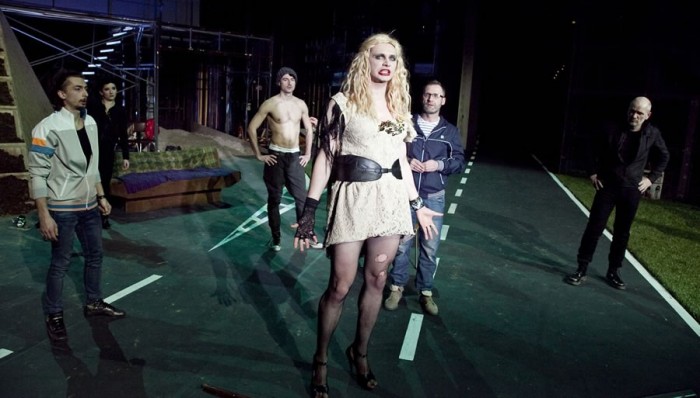 photo: Natalia Kabanow, Polski Theatre in Wrocław
photo: Natalia Kabanow, Polski Theatre in Wrocław
We attend a highly theatrical morning press conference for the protest, in a large upstairs salon of the Teatr Dramatyczny. The room is packed with reporters, theatre people and observers. Standing in the back, the visiting playwrights huddle by their guide and translator Dorota Sobstel and try to follow as best they can. They take pictures of the crowd. We can’t see the speakers at the centre of the room, but we can hear them. “Theatre is a component of democracy,” one man declaims.
In the mornings and afternoons, the visitors meet with Polish professors, critics, and playwrights; in the evenings, they see performances. Their first WST play is Jak być kochaną (How To Be Loved); they talk with director Weronika Szczawińska and playwright Agnieszka Jakimiak the next morning, in a conversation moderated by professor Krystyna Duniec (one of the anthology editors). The immersion in Polish theatre culture is helping the writers. Playwright Nahal Navidar tells me about reading the plays back in Los Angeles, and feeling that there was a quality that was eluding her. But being here in Warsaw, she feels closer to understanding the context, and to being able to interpret the scripts.
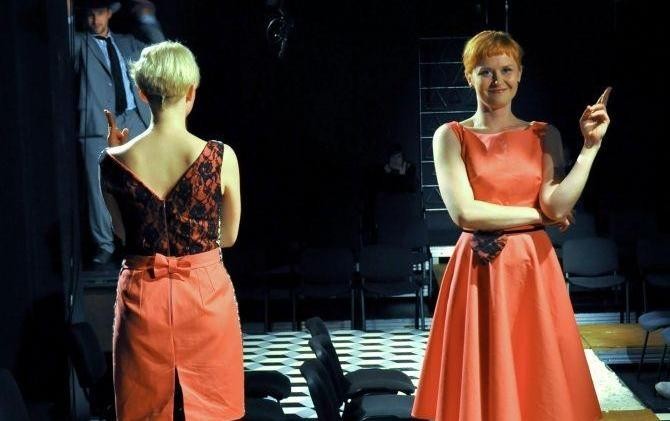 Jak być kochaną, photo: Izabela Rogowska, WST
Jak być kochaną, photo: Izabela Rogowska, WST
Klass also arranges for the writers to see events outside the festival, to give them a wider range of experiences with Polish theatre. They encounter Grzegorz Jarzyna’s T.E.O.R.E.M.A.T. at TR Warszawa (a favourite of the group for its dreamlike quality) and Krzystof Globisz’s monodrama Jekyll/Hyde at Teatr Polonia, directed by Jakub Porcari, but they also explore farther afield. One night, the group attends a Komuna//Warszawa satire, Sierakowski, followed by a screening of Studium Teatralne’s documentary Koniec pieśni (The End of Song), about the downturn of Polish folk songs. The two theatres work in neighbouring buildings in Warsaw’s Praga neighbourhood, on the eastern bank of the Vistula, but they are as different as the Clash is from Simon & Garfunkel.
Sierakowski is a Brechtian send-up of the Polish left-wing activist and Krytyka Polityczna (Political Critique) leader Sławomir Sierakowski. Three actors, flanked by electronic musicians, address the audience presentationally in a robotic but highly engaging series of deadpan sketches. They imagine a future Poland where Sierakowski has become the leader of the country. Sierakowski fights the alien invasion! Sierakowski has a child, whose sex skews the course of history! In the final scene, an elaborate series of interlocking water trails on the floor maps alternate absurd paths for Sierakowski’s future. Though the production’s underlying theme is one of skepticism, the mood is light.
After Sierakowski, the group walks next door to Studium Teatralne. Actress Gianna Benvenuto greets them; over pre-screening sandwiches, she explains ST’s history and connections to the theatrical work of Jerzy Grotowski. Studium director Piotr Borowski toured small towns in eastern Poland, collecting and recording traditional songs, twenty years ago. In Koniec pieśni he returns to play the recordings for the surviving townspeople and their descendants, and videotapes the process. The film is unabashedly nostalgic. The juxtaposition of these two experiences complicates the visitors’ growing picture of Polish theatre.
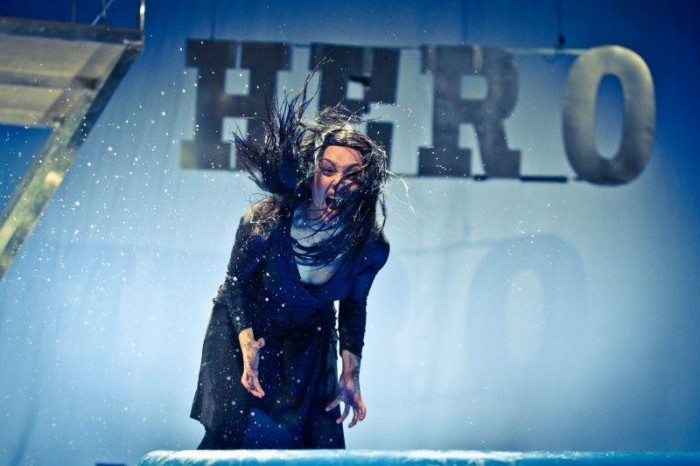 photo: Bartłomiej Sowa, Współczesny Theatre in Szczecin
photo: Bartłomiej Sowa, Współczesny Theatre in Szczecin
As the week progresses, the writers spend a day focusing, in turn, on each of the three plays from the anthology they are working on: Paweł Demirski’s Diamenty to węgiel który wziął się do roboty (Diamonds Are Coal That Got Down To Business), which imports characters from Uncle Vanya to the industrial Polish Rust Belt-esque city of Wałbrzych; Przemysław Wojcieszek’s Cokolwiek się zdarzy, kocham cię (Whatever Happens, I Love You) and Dorota Masłowska’s Między Nami Dobrze Jest (No Matter How Hard We Tried).
Demirski and director Monika Strzępka – a famous husband-wife artistic team – are swamped with the momentum of the protest and unable to meet. Their theatre, in Wałbrzych, is directly affected by the proposed government intervention. But Wojcieszek and Masłowska each spend a productive morning with the writers. Translators are present to discuss nuances; actors read scenes from the plays, in both English and Polish, so everyone can hear the rhythms.
The writers’ last WST play is III furie (Three Furies) at Teatr Studio. It’s a performance from Legnica’s Teatr Modrzejewskiej, written by playwrights Sylwia Chutnik, Magda Fertacz and Małgorzata Sikorska-Miszczuk, and directed by Marcin Liber. No empty seats – surplus audience members sit cross-legged on the floor at the edge of the stage.
In the world of III furie, the crimes of the parents are visited on the children, and the crimes of the children are visited on the parents, so that all the world is guilty. A mother gives birth to a deformed child, in punishment for her ancestors’ crimes. A Greek chorus of merciless gods cackles at a second condemned woman – this one blamed for her son’s overzealousness in killing people for the Polish WWII resistance army (Armia Krajowa). She writhes on the linoleum in a bloodstained slip.
After the play is over, the protest letter is read aloud again. “Teatr nie jest produktem – widz nie jest klientem.” The audience sits obediently and listens through the whole thing. By this time, under public pressure, the local government in Lower Silesia has already begun to back down. The group that formed around the letter accomplishes its central short-term goal, but no changes have been made to the funding cuts that also prompted the protests.
The next day, the playwrights return to Los Angeles, but another friend from the United States, a set designer, comes to town, in time for the end of the WST. We walk through Plac Zbawiciela, past a procession of pre-Easter-weekend worshippers, and head to the Instytut Teatralny for Był sobie dziad i baba (Once upon a time there was an old man and an old woman) a piece created by Agnieszka Błońska in collaboration with four retired dancers.
The dancers’ will to perform is undiminished. They re-enact routines from their youth, and when unable to produce certain movements – lifts, jumps, spins – they simply say the name of the step. A dancer repeats “Arthritis” as she touches different parts of her body. One man, the most frozen by age of the group, cranks through his routine with the vigor of a wind-up soldier.
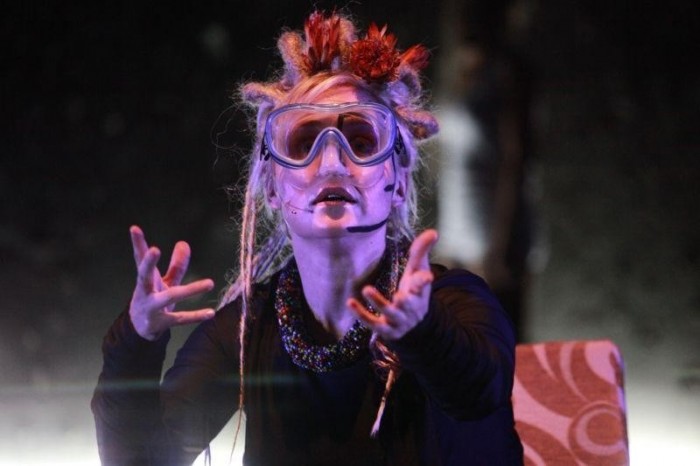 photo: Natalia Kabanow, Polski Theatre in Wrocław
photo: Natalia Kabanow, Polski Theatre in Wrocław
The festival concludes, in a flutter of unseasonable April snow. Hailstones clatter along Marszałkowska street. The visitors clear out of Warsaw. As mentioned, the business manager was never appointed to oversee the artistic directors in Lower Silesia. The “unique phenomenon that is artistic theatre in Poland” resisted this dangerous, potentially precedent-setting attempt at diminishing its autonomy. From the point of view of an outsider, it seems that it is the very conviction of the theatres that their work is not a commodity that makes the statement “Teatr nie jest produktem...” true. It is not only the quality of the art, but also the quality of confidence, almost a sense of a mission, possessed by these theatre artists. The Polish theatres seem able to regard their own work with unapologetic pride, to defend themselves against attempts at compromising the character of that work, and to act collectively.
However, this ability to act in unison to achieve common goals, successful in the short term, may or may not continue to be effective in the future. Months after the WST, the longer-term efficacy of the group that formed around the letter is not clear. As mentioned, the underlying concern about the recent cuts to state funding for theatres has not been addressed. In addition, according to one Warsaw observer, some of the individuals who signed the protest letter may have been hoping for new theatre director positions as a result of their support, and were disappointed. The question of whether this protest group can remain cohesive, and lobby together for other common goals in the future, is as uncertain as the outcome of Sierakowski’s war with the aliens.


